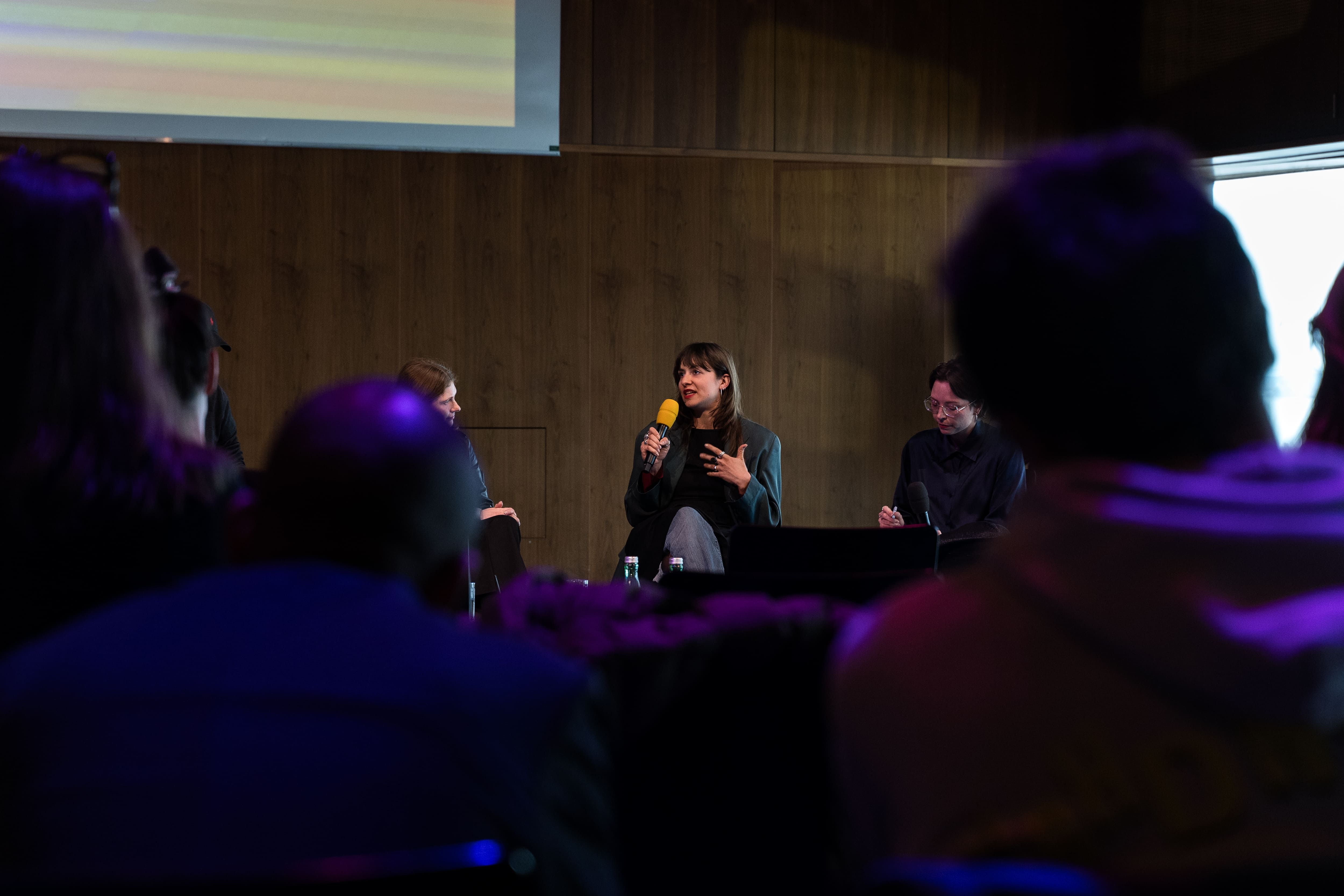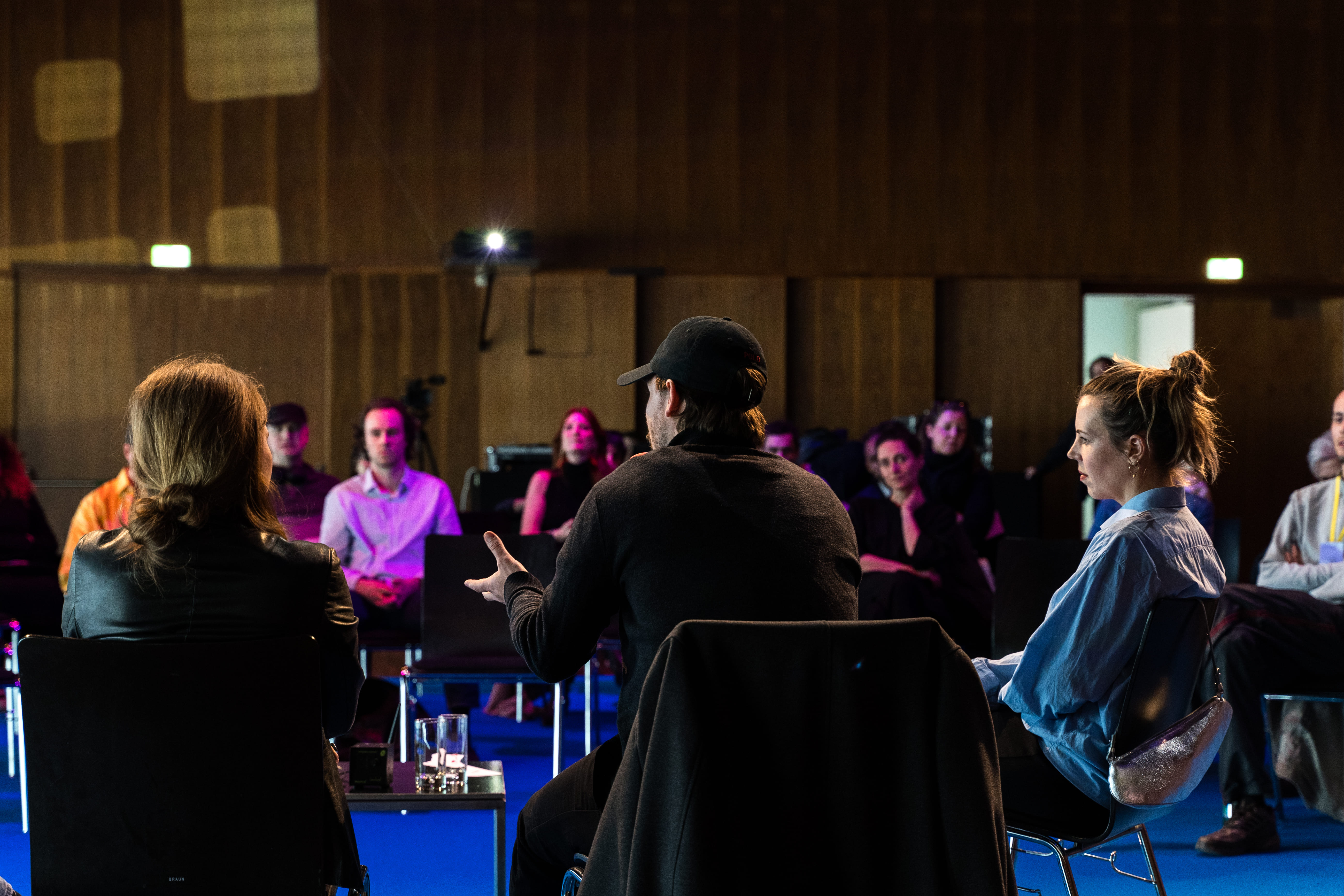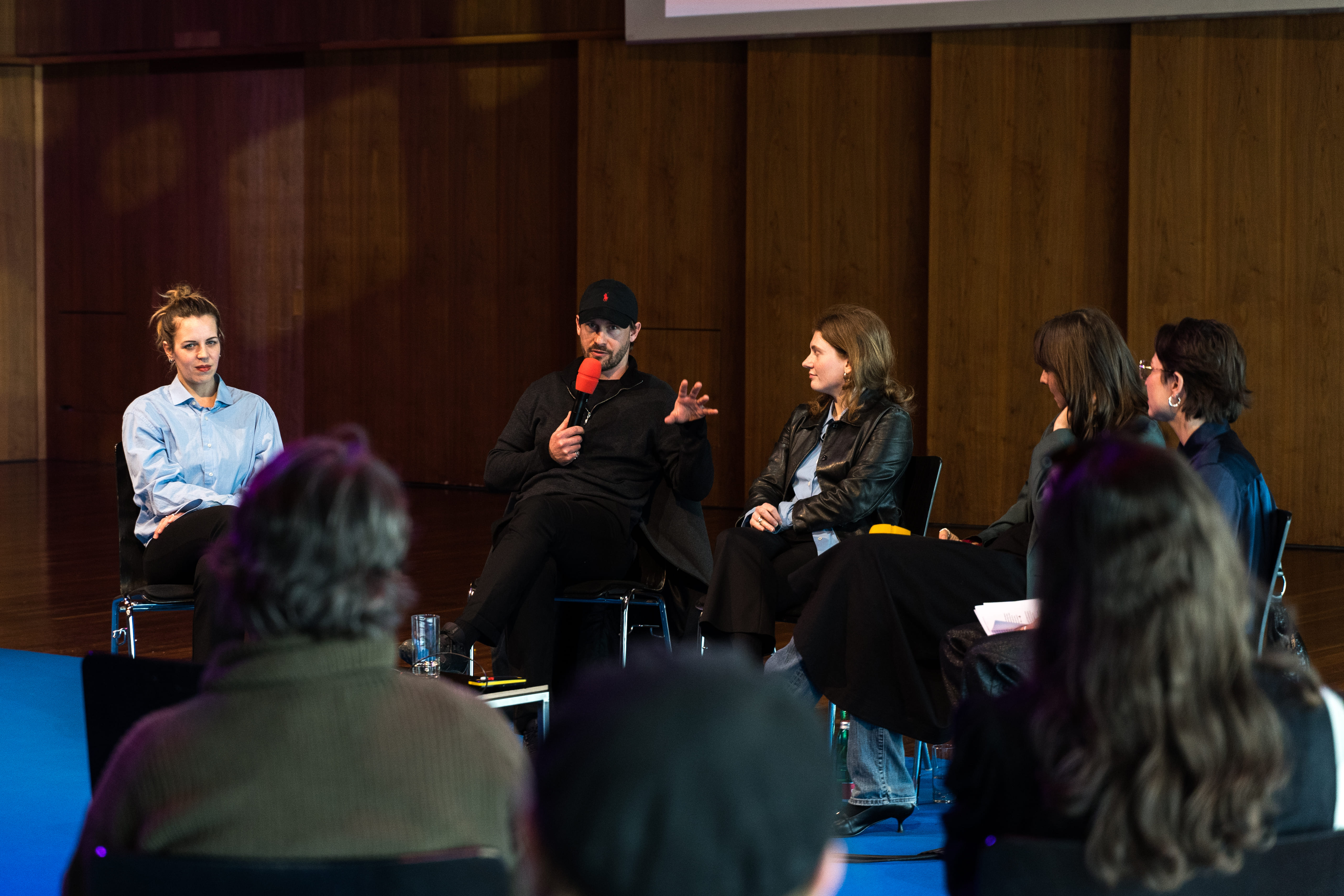PP1
21.03.25
Staging Performance: Live Art in Curatorial Practice Today
‘Staging Performance: Live Art in Curatorial Practice Today’ was an open panel held at the art fair STAGE Bregenz 2025. Within the hourly discussion, topics such as performativity, curatorial challenges of performance art in public space and at public events were contextualized, and its ramifications framed.
The speakers commenced by trying to define performance art in their words. Performance art as a confrontation with unknown things, a social gathering, but also performativity in general talks about the temporality of life, as something yet about to become, something rupturing the daily rhythm, an activation, a confrontation.. Having its roots within Avant-garde movements like Dada and Fluxus, performance art comes with a certain shift in its framework of perception. Within this tradition it can also be seen as a questioning of traditional art forms.
Theatricality and performativity can also happen outside specific precoded venues, such as locations in public space. Inherently it stands in opposition to the capitalized objects, still consumable, but after its staging only living in our memories. Potential images remain only derivatives of the actual thing, never ever possible to experience the same twice again, as the audience and circumstances will constantly change.
The commodification of performance art therefore is difficult to achieve or even an illusion. In some way, performance art has entered the market and will continue to do so. How can the experience of the audience, our perception of the event itself be packaged, remembered, restored or taken away? The performance as work and its essence (Wesen) will remain hidden and only be shown in the moment of staging.
Thus, a documentation of a live event only confronts us with the inadequacy of current technology. We subsequently face curatorial challenges going beyond the actual event, dealing with its aftermath. The dichotomy of a performance being live/alive and recorded/dead is also a trap we must resist. Discourse happens in the in-between and also needs to be accounted for - the same as seeing beauty within the intuitive, the not yet discovered.
How can we hold space? How can we make performance art more accessible? More urgent? How can we grab attention? How can we arrange everything for people to truly connect with the piece? How can we plan for potential failure? How can we stay playful and agile? How can we ensure authenticity and participation?
Speakers: Marlene Schenk (curator and director of Kunstverein Friedrichshafen), Lukas Weithas (curating DOCK20 life (performance format) / visual and performance artist based in Bregenz), Camille Regli (independent curator based in Zurich and Biel/Bienne, co-founder/co-director of KRONE COURONNE in Biel-Bienne), Monica Unser (Zurich-based art historian and curator, assistant curator at Cabaret Voltaire, artistic co-director of Perrrformat and co-curator of Plattform), moderated by Martina Morger (visual and performance artist, co-artistic director of Perrrformat)
Meeting point: Platz d. Wr. Symphoniker 1, 6900 Bregenz, Austria



Staging Performance: Live Art in Curatorial Practice Today, 2025, photo by Rene Giesinger / Cats and Lion © STAGE Bregenz
Staging Performance: Live Art in Curatorial Practice Today, 2025, photo by Rene Giesinger / Cats and Lion © STAGE Bregenz
Staging Performance: Live Art in Curatorial Practice Today, 2025, photo by Rene Giesinger / Cats and Lion © STAGE Bregenz
Supported by:
STAGE Bregenz
DOCK 20
Kulturverein Friedrichshafen
PP1
21.03.2025
Staging Performance: Live Art in Curatorial Practice Today
‘Staging Performance: Live Art in Curatorial Practice Today’ was an open panel held at the art fair STAGE Bregenz 2025. Within the hourly discussion, topics such as performativity, curatorial challenges of performance art in public space and at public events were contextualized, and its ramifications framed.
The speakers commenced by trying to define performance art in their words. Performance art as a confrontation with unknown things, a social gathering, but also performativity in general talks about the temporality of life, as something yet about to become, something rupturing the daily rhythm, an activation, a confrontation.. Having its roots within Avant-garde movements like Dada and Fluxus, performance art comes with a certain shift in its framework of perception. Within this tradition it can also be seen as a questioning of traditional art forms.
Theatricality and performativity can also happen outside specific precoded venues, such as locations in public space. Inherently it stands in opposition to the capitalized objects, still consumable, but after its staging only living in our memories. Potential images remain only derivatives of the actual thing, never ever possible to experience the same twice again, as the audience and circumstances will constantly change.
The commodification of performance art therefore is difficult to achieve or even an illusion. In some way, performance art has entered the market and will continue to do so. How can the experience of the audience, our perception of the event itself be packaged, remembered, restored or taken away? The performance as work and its essence (Wesen) will remain hidden and only be shown in the moment of staging.
Thus, a documentation of a live event only confronts us with the inadequacy of current technology. We subsequently face curatorial challenges going beyond the actual event, dealing with its aftermath. The dichotomy of a performance being live/alive and recorded/dead is also a trap we must resist. Discourse happens in the in-between and also needs to be accounted for - the same as seeing beauty within the intuitive, the not yet discovered.
How can we hold space? How can we make performance art more accessible? More urgent? How can we grab attention? How can we arrange everything for people to truly connect with the piece? How can we plan for potential failure? How can we stay playful and agile? How can we ensure authenticity and participation?
Speakers: Marlene Schenk (curator and director of Kunstverein Friedrichshafen), Lukas Weithas (curating DOCK20 life (performance format) / visual and performance artist based in Bregenz), Camille Regli (independent curator based in Zurich and Biel/Bienne, co-founder/co-director of KRONE COURONNE in Biel-Bienne), Monica Unser (Zurich-based art historian and curator, assistant curator at Cabaret Voltaire, artistic co-director of Perrrformat and co-curator of Plattform), moderated by Martina Morger (visual and performance artist, co-artistic director of Perrrformat)
Meeting point: Platz d. Wr. Symphoniker 1, 6900 Bregenz, Austria



Staging Performance: Live Art in Curatorial Practice Today, 2025, photo by Rene Giesinger / Cats and Lion © STAGE Bregenz
Staging Performance: Live Art in Curatorial Practice Today, 2025, photo by Rene Giesinger / Cats and Lion © STAGE Bregenz
Staging Performance: Live Art in Curatorial Practice Today, 2025, photo by Rene Giesinger / Cats and Lion © STAGE Bregenz
Supported by:
STAGE Bregenz
DOCK 20
Kulturverein Friedrichshafen